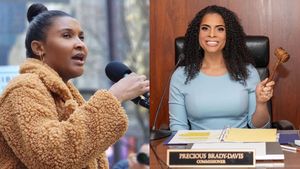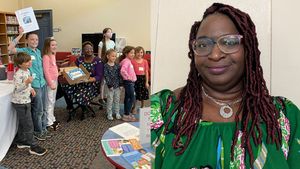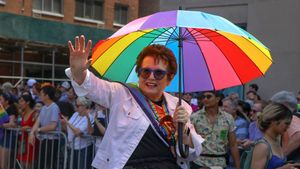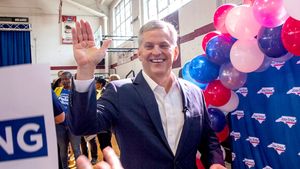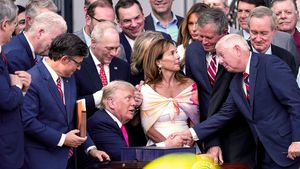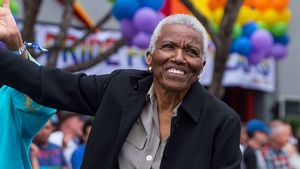Dan Levy knows, perhaps a little too well, that all good things must come to an end. Barely one year after Schitt's Creek -- the show he created, produced, wrote, and starred in -- became an international phenomenon, Levy resolved to bring the series to its finale. "We've decided season six will be our last," he wrote in a letter addressed to "Our Dear Fans," which was published via social media. "It's not lost on us what a rare privilege it is in this industry to get to decide when your show should take its final bow. We could never have dreamed that our fans would grow to love and care about these characters in the ways that you have."
Although it was a brave and lauded creative decision -- ending a series at its height versus waiting for it to fade, episode after episode -- the gravity of it didn't really sink in until one evening on set, when the last "Cut!" was announced. While everyone began to pack up and head out, Levy, who had been running on 11 total hours of sleep over the past six days of filming, finally allowed himself to realize what was happening. "I was just reveling in every single moment," he says. "When I went to bed every night, I did so knowing that I was savoring every last drop of this experience."
After the sets had mostly emptied, Levy began to wander through the universe he built -- with the help of his father -- some seven years ago. Starting with the motel rooms where the Rose family landed, indignant, after their unceremonious fall from wealth, he took in everything from the rickety beds to Moira Rose's famous wall of wigs. He revisited the check-in desk of the Rosebud Motel, where his character, David, once flirted mischievously with Stevie (played by Emily Hampshire), and the Cafe Tropical diner, where Twyla (played by his sister, Sarah Levy) served as an open ear for the endearingly self-absorbed Alexis (Annie Murphy).

Dreaming In Color
Coat by Lanvin. Knit by KENZO. Pants by Bottega Veneta. Boots by Michael Kors.

After concluding his lap around the set, Levy re-entered the Rose's motel room for the last time. There, he found his onscreen sister, Murphy, having her own final moment with the place their characters would learn to lovingly (if begrudgingly) call home. They locked eyes, and wordlessly, hugged each other tightly as the tears came. There was no "Ew, David" to be heard.
For now, though, the sadness around the show's ending has mostly subsided, thanks to some welcome distractions. The final season of Schitt's will air in 2020, and Levy is still very much immersed in the Rose family's antics. "I'm currently editing the third episode," he says over the phone. "But by the time I get to 11, 12, or 13, I think I'll be feeling it again in a big way."
This month, for the first time, Levy and the Schitt's team will head to the Emmys, where they're nominated in four categories -- including Best Comedy Series, Lead Actor and Actress in a Comedy Series (for Eugene Levy and Catherine O'Hara, respectively), and Outstanding Contemporary Costumes. "It's surreal," Levy says of the honor. "A show this small -- if we were to just lay out the ingredients -- should never have ended up at the Emmys. It's an impossibility! The fact that we somehow got there and were the dark horse on all these lists and surpassed all these different shows? It doesn't make any sense."
It's hard to say whether or not Levy, who exudes a distinctly Canadian niceness, is simply being humble here or totally sincere. Either way, what's easier to say is that, on this topic, he's completely wrong. Schitt's Creek always had the ingredients of a truly fantastic, award-winning show. It just took the rest of us to catch up to its genius.
Eugene Levy insists he never knew his children wanted to follow in his career footsteps. "It's not something I would've encouraged," he says, admitting, "It's not the easiest way to make a living."
A younger Daniel Levy didn't always make his ambitions known -- in fact, he may have conveyed the opposite intentions during his teenage years. "As a kid, he never liked the idea that I would be recognized or that people would come up to me on the street," his father says. "So if we were walking together, he'd always walk up ahead of the family."
As Levy grew older and more interested in things like school plays or productions, his father would ask if he needed assistance, like running lines or words of wisdom. "It was always, 'I got it. No, that's fine, thanks. But I got it.'" While there's a common belief that proximity to the spotlight comes with its perks and privileges, Levy never really wanted anything to do with it. "Growing up, once I started to realize that I enjoyed acting, I knew that when people heard I was my dad's son, there was an impulse to compare us or even write me off," he says.
 Owning the Airwaves
Owning the Airwaves
Jacket, zip up, shirt, and pants by Junya Watanabe. Shoes by Converse X JW Anderson.
"I always told myself that if I were ever to work with my dad or approach him about help, I'd want to be completely confident and very sure that the idea I would bring to him -- considering I respect him so much -- was one of quality. It came down to just being confident in what I could bring to the table."
About a year before he was due to graduate college, Levy was approached by MTV for a spot on its new daily show, MTV Live. "It was one of those opportunities where I could always go back to school, but I didn't know if I'd always have the opportunity to be a host on MTV at the age of 20," he says. So, he dropped out and dove headfirst into the entertainment business. All the while, he made sure the name he was making for himself was distinctly his own: It would be five years before Levy would feel comfortable enough in his abilities to publicly acknowledge his father.
But even with the MTV job -- and the TV and film gigs that would eventually accompany it -- Levy still felt like he hadn't reached his true potential. "A lot of it, for me, goes back to Oprah," he says. "Watching what she was able to do with her platform, and how she was able to turn daytime TV into focusing on the good, inspirational stories that changed conversations and inspired us made me ask myself, 'How do you do something like that? You'll never be Oprah. But what can you possibly do in your life that can service the greater good?'"
The answer, of course, came to him while watching reality television, where a novel thought popped into his head: "What would happen if one of these wealthy families would lose everything? Would the Kardashians still be the Kardashians?"
Finally, for what Eugene Levy says was the first time in his life, his son Daniel asked him for help.

Canadian Tuxedo
Above: Shirt by Gucci. Pants by Bode. Necklace worn as bracelet by Tiffany and Co. Below: Jacket and pants by Helmut Lang. Belt by The Kooples.

The most crucial part of Schitt's Creek's genius came in the form of "character work," an exhaustive process inspired by Eugene Levy's collaborations with the director Christopher Guest, who inspired vibrant (and hilarious) performances in his mockumentaries Best in Show and Waiting for Guffman. "We spent probably two weeks writing out the biographies of each and every one of the characters," says the younger Levy. "That was one of the greatest gifts my dad gave me, because I really wanted to just write it, and he was the one who said that we needed to take the time to figure out who the people are first, and that the writing was last, the icing on the cake."
The duo created timelines dating all the way back to their characters' elementary and middle school years, detailing everything from where they worked to what perfume they wore at which point in their lives. "Once we understood who they were, that's when we had the freedom to push them to their limits, and knew how to bring out their best and worst," Levy says.
Levy's favorite part of character work, though, was inspired by one of his very favorite television shows: Sex and the City. "I looked at how Patricia Field played with clothes in that show," he explains. "For us, I don't want the characters to constantly have to tell the audience, 'We used to be rich.' So the most effective device we had sometimes was their wardrobe -- it's a constant reminder they came from money."

Sitting Pretty
Knit and boots by Paul Smith. Kilt and pants by Polo Ralph Lauren.

The best illustration of this is probably the outlandish wardrobe of Moira Rose, whose fascinators, shoes, and purses often look hilariously (if fabulously) out of place. Levy has personally taken it upon himself to track down numerous standout pieces for his characters, including a pair of penguin-like boots by Balenciaga, a "spine heel" by DSquared2, and a pink strapless dress from Raf Simons' final collection for Jil Sander, which Alexis wore in the series premiere.
After the character work was mostly settled, Levy put the icing on the cake -- as in, he wrote the script -- and the show's first season premiered on the CBC in Canada on January 13, 2015 (and later, on Pop TV in America). Once the reviews hit, Levy's worst fear (being compared unfavorably to his father) seemed to come true: Variety called the show a "slapdash exercise that can give nepotism a bad name," while The New York Times went further, saying he didn't "appear to have inherited any of his father's comic acting abilities."
Unfazed, Schitt's Creek garnered an impressive audience, exhibiting growth season after season -- and, according to Vulture, the show saw "its linear ratings more than double and its overall audience soar past 3 million viewers." But there are two things that put the small town of Schitt's Creek on the map in a big way for American audiences.

On the Soapbox
Coat by AMI. Pants by Boss. Shoes by Louis Vuitton.
First is purely a data game: Schitt's debuted on Netflix in 2017 and, while the streaming service famously doesn't give out audience numbers, anyone who logged onto social media in its aftermath could've sensed its impact. What Netflix lacks in transparent data can be seen in casual conversation: Schitt's Creek became the little-known sitcom that everyone was talking about.
"Whenever the season drops [on Netflix], it feels like we've just relaunched. We see a lot of social media activity," Levy told Vulture.
Second, though, is something that's a lot nearer and dearer to audiences' hearts: the romantic storyline shared between David and Patrick (Noah Reid). Instead of the comedy using these two gay characters as their punchline (which is all too common), Levy intentionally made Schitt's Creek a town without homophobia, thus turning the trope of the "small-minded small-town folks" on its head.
"From day one, the town was going to be an oasis in terms of acceptance and love," Levy says. "What we didn't want was for the small town to be the butt of the joke -- we wanted the joke to be on the Rose family, and how they learn by watching this town that's high-functioning, loving, confident, secure, and accepting."
So when Patrick arrives as a sort of small-town Prince Charming, an extra layer of sentimentality was added to Schitt's Creek. There was one storyline in season four that tugged at the heartstrings of audiences everywhere, prompting headlines, analyses, and rave reviews the very morning after it aired. (TV Guide would call it "the most romantic scene on television.") The scene itself was relatively simple -- in fact, we've watched versions of it dozens of times, only portrayed by heterosexual characters. During an open mic night, Patrick takes the stage and, in front of the entire town, begins to serenade David with an acoustic version of Tina Turner's "The Best." The camera alternates between the two of them, locking eyes adoringly, as their loved ones look on.
"There's a moment in that scene where Catherine, as Moira, caught up in the moment, reaches out and grabs my arm," Levy recalls. "That was a choice she made that I wish I'd scripted, because it could bring me to tears thinking about it right now. Just the physical touch and support of a parent to their queer child in a moment of such vulnerability -- it spoke volumes to me in terms of what this show is about and what we wanted it to stand for."
Later on in the series, Patrick's parents come to town, and the Roses quickly realize that they are unaware of his being gay (or his relationship with David). The characters' subsequent tiptoeing around Patrick's sexual orientation delivers quite the comedy Schitt's is known for, but the episode ultimately ends in a touching coming-out scene. "You are the only thing in the world that matters to us," his mother says, grabbing Patrick's hands in hers. "And if David makes you happy, then that's all we care about."
Levy's own coming out was, he admits, slightly less climactic than the one he wrote for television. One day when they were out to lunch together, his mom casually popped the question: Are you gay? Relieved, he answered in the affirmative, his family was then told, and that was that. "In retrospect, I was just waiting for her to ask, because I really don't know whether or not I would've had the strength to do it on my own. I'm grateful to her for that."
Still, Patrick's coming out was, he says, "the most difficult episode" he's ever written. "My hope was that if other parents saw how love-filled that moment could be, that might inspire them to do the same thing."
In turn, Levy says, the LGBTQ+ audience has become the show's most vocal, with fans writing in (both physically and on social media) with such volume that he can't keep up. They're also an action-oriented bunch: For Levy's 36th birthday, his fans organized online to donate over $20,000 for the LGBT Youth Line in his name. But for many queer viewers watching at home, Schitt's became an escape from their own lived realities, where things like accepting parents and happy endings for romantic storylines seem all too far away. This has formed a sense of responsibility in Levy that's now not just intended for his characters, but also his young audience. In fact, he's specifically reached out to meet up with fans who write into the show to thank them for their support. "Getting to do this show has broken open this whole world of joy that I never saw coming," he says.
Or, as his co-star O'Hara puts it, "Daniel has created a world I want to live in."

Business at Hand
Jacket by AMI. Shirt by Dunhill. Pants by Hermes. Bracelet by Tiffany and Co. Talent's own glasses (throughout).

So why, then, is Schitt's Creek ending at what appears to be its apex -- as audiences and critics have (finally) caught on to its genius? "Blame it on Dan!" his sister, Sarah says, laughing. "We would've all kept going!"
But the truth is, the master plan was worked out well before the public caught on to the show. Levy is doing to Schitt's Creek what we only wish we could do to every hidden neighborhood gem before it turns into a gentrified tourist trap: protecting it, and preserving it for eternity. "A lot of this attention came within the last six or eight months, and by the time that some pretty major publications started writing about the show, I had already written most of season six," Levy says.
But as the show ends, it's clear that Levy's own storyline is just beginning. Schitt's Creek has given him a taste of his true potential, unlocking Oprah-levels of connection and community. But perhaps the most compelling reason to move on from the show is that David, who we were initially introduced to as a socially awkward, intimacy-fearing young man, has, well, grown up. "What everyone's seeing with David on the show -- David is a heightened version of [Dan]," says Levy's sister.
Levy is willing to concede that "there are similarities." "In a way, writing him and playing him and how unfiltered he is throughout his day-to-day, even if that is rooted in some sort of overcompensation, has really inspired me to be bolder in terms of owning my feelings," he says. Many of David's intimacy issues, for example, stem from Levy's own relationship challenges. "Everyone has an arsenal of bad relationship stories, but one of the things I've since long overcome was a feeling of not being worthy -- and there was a time in my life when I was dating people and I was grateful just to have their attention. It was a toxic way of operating in a relationship."
Giving David his own "happy ending," then, was a form of catharsis. "I wanted him to live in that safe space where he can let his guard down and be vulnerable, and be loving and warm," Levy says. But even though he hasn't found his relationship version of a happy ending, he's found fulfillment that very well may open himself up to whatever the future brings. "When I was developing David as a character, I thought back to a time in my life that I've long since moved past in terms of personal growth and self-worth. It was a shared world we had -- a past where you give yourself away to people and overlook your own needs to keep others in the mix."
"That vulnerability in David is what became a driving force in his trajectory throughout the six seasons of our show," Levy adds. "At some point, you're tiptoeing around people or are trying to be someone you think people want you to be. In reality, it's your own authentic self who's going to be 'the one.'"
And now, with a series finale under his belt and four Emmy nominations, David Rose (and a smash hit television show) gave Dan Levy a whole new lease on life. "I'm excited to continue to tell stories that hopefully change conversations. And I hope, essentially, to be of service," he says. "Ultimately, I just want to make Oprah proud."
Photographed by Ryan Duffin
Styled by Corey Stokes
Grooming by Laila Hayani for Exclusive Artists using Hanz De Fuko.
Photo assistant: David Oramas.
Fashion assistant: Kat Mateo
Dan Levy is part of a double cover for Out's 2019 Fashion Issue alongside Janet Mock. The issue will be available on newsstands on October 1. To get an advanced look at the issue, preview articles here, or view it on Apple News+, Kindle, Nook, and Zinio beginning September 24. Grab your copy by subscribing now.






 Owning the Airwaves
Owning the Airwaves





























